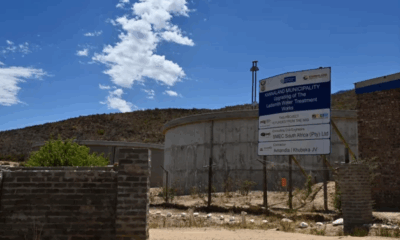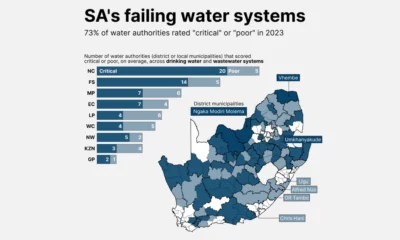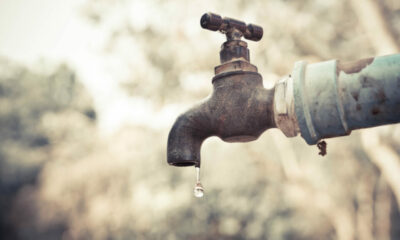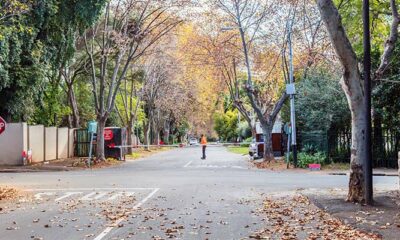News
South Africa’s Water Crisis Deepens: Cities Race to Fix Leaks, Illegal Connections, and Failing Infrastructure

South Africa’s Water Crisis Deepens: Cities Race to Fix Leaks, Illegal Connections, and Failing Infrastructure
South Africa’s biggest cities, Cape Town, Johannesburg, and Durban are once again facing the same old battle: keeping the taps running. What used to be routine maintenance has become a high-stakes race to prevent system collapse as leaks, illegal connections, and decaying infrastructure push municipalities to their limits.
Across the country, water teams are digging, patching, and repairing in a desperate bid to stop the bleeding, both literally and financially. For many residents, this month has felt like a return to “crisis mode.”
Cape Town: Fighting the Clock to Secure the Future
In Cape Town, the City’s Water and Sanitation Department kicked off a major maintenance drive this week, affecting areas from Kuils River to Fish Hoek, Delft, and Woodstock. Residents have been warned to store water for up to ten hours of planned outages while engineers replace old pipes, valves, and seals.
City officials say the goal is simple but urgent: reduce “unaccounted-for water”, losses caused by leaks, illegal use, and inaccurate meters.
The operation includes “zero-pressure tests” to find weak spots in the network, a method that temporarily cuts water supply but helps identify leaks before they turn into pipe bursts.
“The aim is to ensure the future continuity of water supply,” the City said in a statement. “We’re investing in prevention rather than emergency reaction.”
For many Capetonians, the work is a painful reminder of the 2018 Day Zero scare, when the city came dangerously close to running out of water altogether.
Johannesburg: Cracking Down on Illegal Connections and Non-Payment
Up north, Johannesburg is grappling with its own water war, this one fuelled by illegal connections, non-payment, and crumbling pipes.
Protests have erupted in several communities, including Westbury and Coronationville, where residents have endured dry taps for days at a time.
Mayor Dada Morero announced a sweeping turnaround plan this week, including the ringfencing of Johannesburg Water as a trading entity. This means the utility can now manage its own finances, improving accountability and service delivery.
“The goal is to restore reliability and financial sustainability,” Morero said.
To curb water theft, the city has disconnected three informal settlements from illegal networks and is partnering with private contractors to drill boreholes in high-demand zones. It also plans to rehabilitate reservoirs and wastewater plants that have been running on borrowed time.
Residents have cautiously welcomed the moves, though many argue that consistent maintenance, not crisis interventions, is what’s really needed.
Durban: ‘War on Leaks’ in eThekwini
Further east, Durban’s eThekwini Municipality is waging what it’s calling a “war on leaks.” Earlier this month, the city shut down its Northern Aqueduct for nearly 27 hours to fix four major leaks, including one near the Piesang River.
The operation left thousands of residents in Phoenix, KwaMashu, Umhlanga, and Durban North without water for more than a day, but officials insist it was necessary to reduce massive losses.
The city has budgeted R40 million for the 2025/26 year to replace 22 of its most problematic pipelines. In the past year alone, eThekwini has repaired over 1,000 bursts and leaks, a staggering number that reflects both progress and decay.
Municipal spokespersons have urged residents to store water ahead of planned shut-offs, use clean containers, and report leaks promptly.
A Nation Draining Its Future
While each metro faces unique challenges, the thread connecting them is clear: years of underinvestment and poor maintenance have left South Africa’s water systems fragile and reactive.
Experts warn that without sustained funding and better management, water outages could become as common and as politically explosive as load-shedding.
For now, cities are doing what they can to stay afloat. But beneath the surface, the cracks in South Africa’s water infrastructure are spreading and time is running out to patch them up.



























